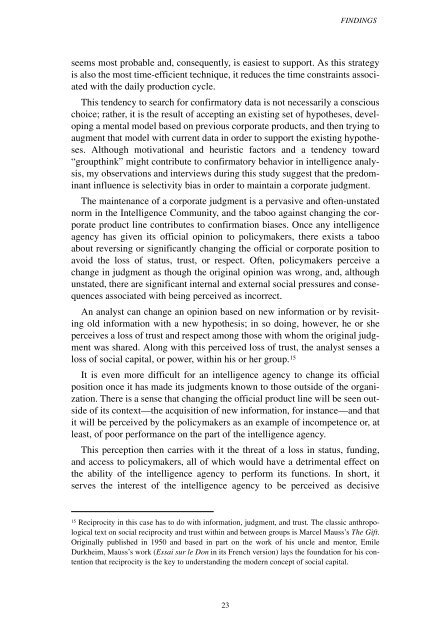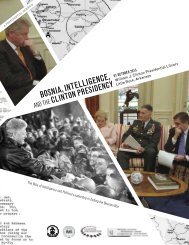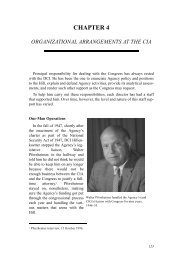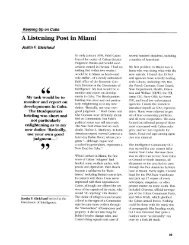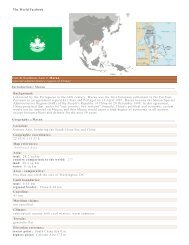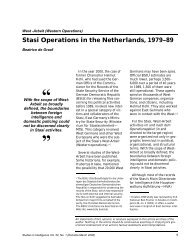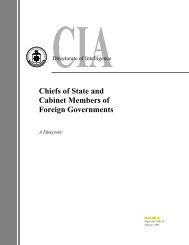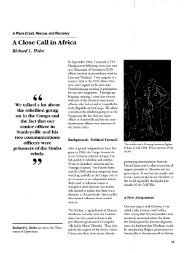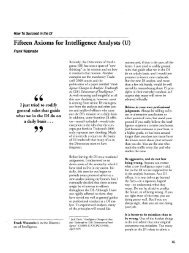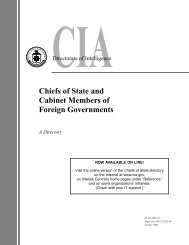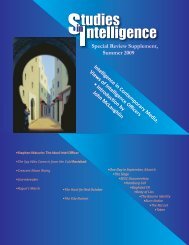Analytic Culture in the U.S. Intelligence Community (PDF) - CIA
Analytic Culture in the U.S. Intelligence Community (PDF) - CIA
Analytic Culture in the U.S. Intelligence Community (PDF) - CIA
You also want an ePaper? Increase the reach of your titles
YUMPU automatically turns print PDFs into web optimized ePapers that Google loves.
FINDINGS<br />
seems most probable and, consequently, is easiest to support. As this strategy<br />
is also <strong>the</strong> most time-efficient technique, it reduces <strong>the</strong> time constra<strong>in</strong>ts associated<br />
with <strong>the</strong> daily production cycle.<br />
This tendency to search for confirmatory data is not necessarily a conscious<br />
choice; ra<strong>the</strong>r, it is <strong>the</strong> result of accept<strong>in</strong>g an exist<strong>in</strong>g set of hypo<strong>the</strong>ses, develop<strong>in</strong>g<br />
a mental model based on previous corporate products, and <strong>the</strong>n try<strong>in</strong>g to<br />
augment that model with current data <strong>in</strong> order to support <strong>the</strong> exist<strong>in</strong>g hypo<strong>the</strong>ses.<br />
Although motivational and heuristic factors and a tendency toward<br />
“groupth<strong>in</strong>k” might contribute to confirmatory behavior <strong>in</strong> <strong>in</strong>telligence analysis,<br />
my observations and <strong>in</strong>terviews dur<strong>in</strong>g this study suggest that <strong>the</strong> predom<strong>in</strong>ant<br />
<strong>in</strong>fluence is selectivity bias <strong>in</strong> order to ma<strong>in</strong>ta<strong>in</strong> a corporate judgment.<br />
The ma<strong>in</strong>tenance of a corporate judgment is a pervasive and often-unstated<br />
norm <strong>in</strong> <strong>the</strong> <strong>Intelligence</strong> <strong>Community</strong>, and <strong>the</strong> taboo aga<strong>in</strong>st chang<strong>in</strong>g <strong>the</strong> corporate<br />
product l<strong>in</strong>e contributes to confirmation biases. Once any <strong>in</strong>telligence<br />
agency has given its official op<strong>in</strong>ion to policymakers, <strong>the</strong>re exists a taboo<br />
about revers<strong>in</strong>g or significantly chang<strong>in</strong>g <strong>the</strong> official or corporate position to<br />
avoid <strong>the</strong> loss of status, trust, or respect. Often, policymakers perceive a<br />
change <strong>in</strong> judgment as though <strong>the</strong> orig<strong>in</strong>al op<strong>in</strong>ion was wrong, and, although<br />
unstated, <strong>the</strong>re are significant <strong>in</strong>ternal and external social pressures and consequences<br />
associated with be<strong>in</strong>g perceived as <strong>in</strong>correct.<br />
An analyst can change an op<strong>in</strong>ion based on new <strong>in</strong>formation or by revisit<strong>in</strong>g<br />
old <strong>in</strong>formation with a new hypo<strong>the</strong>sis; <strong>in</strong> so do<strong>in</strong>g, however, he or she<br />
perceives a loss of trust and respect among those with whom <strong>the</strong> orig<strong>in</strong>al judgment<br />
was shared. Along with this perceived loss of trust, <strong>the</strong> analyst senses a<br />
loss of social capital, or power, with<strong>in</strong> his or her group. 15<br />
It is even more difficult for an <strong>in</strong>telligence agency to change its official<br />
position once it has made its judgments known to those outside of <strong>the</strong> organization.<br />
There is a sense that chang<strong>in</strong>g <strong>the</strong> official product l<strong>in</strong>e will be seen outside<br />
of its context—<strong>the</strong> acquisition of new <strong>in</strong>formation, for <strong>in</strong>stance—and that<br />
it will be perceived by <strong>the</strong> policymakers as an example of <strong>in</strong>competence or, at<br />
least, of poor performance on <strong>the</strong> part of <strong>the</strong> <strong>in</strong>telligence agency.<br />
This perception <strong>the</strong>n carries with it <strong>the</strong> threat of a loss <strong>in</strong> status, fund<strong>in</strong>g,<br />
and access to policymakers, all of which would have a detrimental effect on<br />
<strong>the</strong> ability of <strong>the</strong> <strong>in</strong>telligence agency to perform its functions. In short, it<br />
serves <strong>the</strong> <strong>in</strong>terest of <strong>the</strong> <strong>in</strong>telligence agency to be perceived as decisive<br />
15<br />
Reciprocity <strong>in</strong> this case has to do with <strong>in</strong>formation, judgment, and trust. The classic anthropological<br />
text on social reciprocity and trust with<strong>in</strong> and between groups is Marcel Mauss’s The Gift.<br />
Orig<strong>in</strong>ally published <strong>in</strong> 1950 and based <strong>in</strong> part on <strong>the</strong> work of his uncle and mentor, Emile<br />
Durkheim, Mauss’s work (Essai sur le Don <strong>in</strong> its French version) lays <strong>the</strong> foundation for his contention<br />
that reciprocity is <strong>the</strong> key to understand<strong>in</strong>g <strong>the</strong> modern concept of social capital.<br />
23


